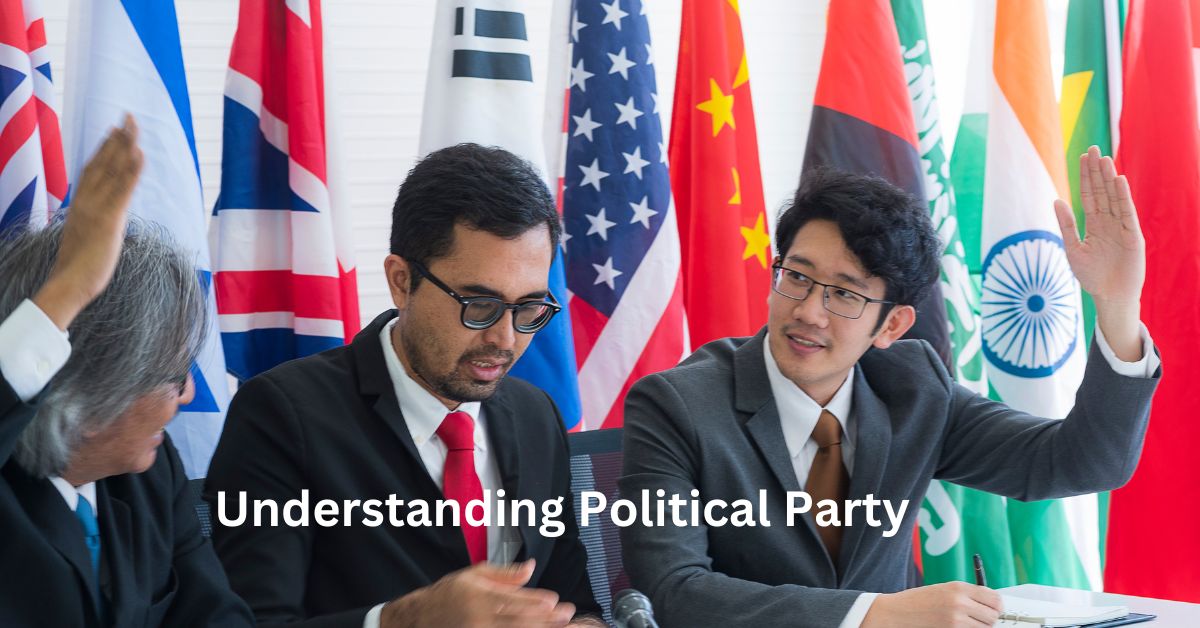In the domain of legislative issues, the term “political party” is omnipresent. But what precisely does it cruel? Political Party In this article, we’ll dig into the perplexing world of political parties, investigating their definition, capacities, sorts, and importance in advanced society.
What is a Political Party?
A political party is an organized gather of people who share comparative belief systems, convictions, and objectives concerning open arrangement and administration. These bunches point to impact government arrangements by challenging decisions and, if effective, actualizing their plan through chosen representatives.
Functions of Political Parties
Political parties serve a few significant capacities inside a equitable system:
Representation: They speak to the interface, values, and concerns of particular bunches or fragments of society.
Policy Detailing: Parties create and advance approaches that reflect their ideological position on different issues, such as healthcare, instruction, and the economy.
Electioneering: Parties field candidates in races, mobilize voters, and campaign for their favored approaches and candidates.
Government Arrangement: Winning parties or coalitions shape governments and accept the obligation of governing.
Checks and Equalizations: Parties in restriction hold the administering party responsible by scrutinizing its activities and advertising elective policies.
Types of Political Parties
Political parties can be categorized based on different criteria:
Ideological Introduction: Parties may be classified as traditionalist, magnanimous, communist, or centrist, depending on their ideological stance.
Scope of Operation: A few parties work at the national level, whereas others center on territorial or nearby issues.
Membership Structure: Parties can be mass-based, with a wide participation, or cadre-based, comprising of a committed center gather of activists.
Election Methodology: Parties may embrace distinctive techniques, such as enormous tent (comprehensive) or specialty (focusing on particular demographics).
Historical Setting: Parties may develop in reaction to particular authentic occasions or social movements.
Significance of Political Parties
Political parties play a urgent part in forming the political scene and administration of a country:
Democratic Interest: Parties give citizens with roads for political interest and representation.
Stability and Administration: They encourage the smooth working of government by advertising coherent approach stages and components for decision-making.
Social Cohesion: Parties offer assistance express and accommodate differing interface inside society, cultivating social cohesion and consensus-building.
Policy Advancement: Competition among parties invigorates the improvement of unused approach thoughts and arrangements to societal challenges.
Accountability: Parties hold chosen authorities responsible to their constituents and give components for redressal through decisions.
Yes, without a doubt. The late 19th and early 20th centuries saw the rise of communist parties over Europe, especially in nations experiencing fast industrialization and urbanization. Political Party The German Social Law based Party (SPD) is a prime illustration of this trend.
The SPD was established in 1875, and by the turn of the century, it had gotten to be the biggest and most persuasive communist party in Europe. It organized itself on a mass premise, pointing to speak to the interface of the working course, which was developing in political significance due to extending suffrage rights and industrialization.
To teach and organize the laborers and wage workers, the SPD conducted participation campaigns and collected contribution from its individuals. This permitted the party to mobilize assets for purposeful publicity, political activism, and social welfare programs. Political Party As a result, the party used critical impact, both politically and socially, and played a significant part in pushing for workers’ rights, social changes, and eventually, challenging the existing control structures.
By 1913, the SPD gloated over a million individuals, making it one of the biggest political organizations in Europe at the time. Its mass participation, along with its organizational ability and ideological coherence, empowered it to shape the political scene of Germany and impact communist developments over the landmass.
Key Takeaways
- Definition and Purpose: A political birthday party is an prepared organization of individuals with similar ideologies, searching for to acquire political electricity thru elections to influence public rules and selection-making tactics.
- Functions: Political parties carry out numerous important functions in a democracy, consisting of representing citizens’ interests, nominating candidates for elections, articulating and aggregating public opinion, and imparting a platform for political participation and mobilization.
- Types of Political Parties: Political events may be categorised into diverse types primarily based on their ideologies, structures, and features. These consist of fundamental events, minor events, ideological events, unmarried-problem events, and local parties.
- Party Systems: Party systems discuss with the range of political events in a rustic and the way they interact. Common party structures consist of -birthday celebration structures, multi-birthday party systems, and dominant-birthday party systems.
- Evolution: Political events evolve through the years in reaction to societal changes, political trends, and shifts in public opinion. Their ideologies, rules, and techniques adapt to stay relevant and competitive.
Advantages of Political Parties
- Representation: Political parties offer a platform for numerous voices and hobbies within society to be represented in the political method.
- Stability: In a multi-celebration system, the presence of a couple of parties can make a contribution to political balance through fostering compromise and consensus-building.
- Policy Formulation: Political events expand and articulate coverage systems that offer electorate clear alternatives during elections and guide governance priorities whilst in electricity.
- Political Education: Parties educate citizens approximately political problems, applicants, and the electoral manner, thereby fostering political recognition and participation.
- Checks and Balances: Opposition events function a check at the ruling birthday party, making sure accountability and preventing the abuse of electricity.
Disadvantages of Political Parties
- Polarization: Political events can make a contribution to societal polarization through fostering partisan divides and inhibiting constructive speak and cooperation.
- Corruption: Parties may additionally come to be prone to corruption, cronyism, and nepotism, particularly when in electricity for extended durations.
- Inequality: Dominant parties may additionally suppress the voices of smaller parties and minority groups, main to inequalities in political illustration and decision-making.
- Gridlock: Party politics from time to time bring about legislative gridlock and policy stalemates, impeding powerful governance and policymaking.
- Partisan Media: Political events may additionally impact or control media shops, leading to biased reporting and propaganda that undermines public discourse and democracy.
Table: Comparison of Two-Party and Multi-Party Systems
| Aspect | Two-Party System | Multi-Party System |
|---|---|---|
| Number of Parties | Two major parties dominate the political landscape. | Multiple parties compete for electoral support. |
| Ideological Diversity | Limited ideological diversity. | Greater ideological diversity with various party options. |
| Stability | Generally stable due to bipartisan cooperation. | Stability depends on coalition-building and consensus. |
| Representation | Limited representation of diverse viewpoints. | More opportunities for diverse representation. |
| Flexibility | Less flexible in accommodating new ideas or voices. | More adaptable to changing political dynamics. |
| Competition | Intense competition between two main parties. | Competition spread across multiple parties. |
FAQs About Political Parties
How do political parties select their candidates?
Political parties regularly utilize a assortment of strategies, counting inside races, party designations, and choice committees, to select their candidates for elections.
Can political parties collaborate with each other?
Yes, political parties frequently shape collusions or coalitions, particularly in parliamentary frameworks, to accomplish common objectives or secure power.
What is the part of cash in political parties?
Money plays a noteworthy part in subsidizing race campaigns, publicizing, and party exercises. In any case, controls exist in numerous nations to anticipate undue impact or corruption.
Are political parties fundamental for democracy?
While political parties are not a prerequisite for majority rule government, they are basic for its working as they give organizational structures for political competition, representation, and governance.
How do political parties advance over time?
Political parties advance in reaction to changing social, financial, and political flow. They may adjust their belief systems, techniques, and authority to stay significant in advancing settings.
Conclusion
Political parties are the foundation of cutting edge majority rule frameworks, speaking to the assorted interface and goals of society. By understanding their capacities, sorts, and importance, citizens can superior lock in with the political handle and contribute to forming the future of their nations.
In outline, a political party serves as an basic vehicle for political interest, administration, and representation in law based social orders. Whether preservationist, generous, communist, or centrist, these organizations play a significant part in forming approaches, races, and the in general direction of a nation’s improvement. As we explore the complexities of present day legislative issues, it is basic to recognize the essential part that political parties play in forming our collective future.










